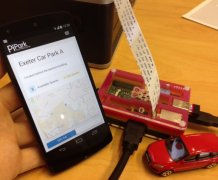articles

The winning system created by Computer Science students Nicholas Sanders and Humphrey Shotton
Prize-winning student invention could banish car parking pressure and reduce emissions
Students from the University of Exeter are celebrating after winning a national competition with their innovative system which could reduce the headache of searching for a parking space, and help reduce vehicle emissions.
Computer Science students Nicholas Sanders and Humphrey Shotton secured victory in the undergraduate category of the prestigious Raspberry Pi programming competition, held at the Science Museum in London.
Their pioneering system, called PiPark, allows motorists to see whether spaces are available in car parks. The device uses a camera attachment that periodically relays parking-space availability data to a central server. This server stores and presents the information on a webpage, showing users where they can park.
By pre-warning drivers if spaces are empty or full, the system helps radically reduce waiting times during busy periods, and more importantly reduces vehicle emissions expended while vehicles queue to park.
Speaking after the event, Nicholas and Humphrey spoke of their delight in securing the award. Nicholas said: “We were really delighted to be shortlisted and to make the finals, and were really looking forward to competing, but to win our category was fantastic.
“The judges came round to each of the teams in turn, and we were asked to present and demonstrate our entry, and answer questions. We think they were impressed with the uniqueness of our design, and the solutions it offers.”
Humphrey added: “We also have to demonstrate our invention to guests at the event, and they asked quite a few questions such as how drivers can access the information, and can it tell drivers exactly where empty spaces are.
“We were able to tell them that drivers could access this information on any internet connected device before they set out on their journey, or if they had a hands-free kit, on the move. Additionally, there is the possibility that this information could be passed directly to a sat-nav device, which could then be used to point you exactly to where an empty space is instead of just to a car park.”
Organisers of the event, PA Consulting, explained why the duo can won their category, saying “The team gave a slick and impressive presentation that took the judges through every step of the process. This project showed a huge variety of skills – from communications to user interface.”
Dr David Wakeling, a Lecturer in Computer Science, who introduced the students to the competition said: “It’s a fantastic achievement and I would like to offer my congratulations to Nicholas and Humphrey on their achievement. It is so pleasing to see them extending and applying knowledge gained at the University to a significant real-world problem, and to such good effect.”
Professor Ken Evans, Dean of the College of Engineering, Mathematics and Physical Sciences, congratulated the students on their victory.
He said: “This wonderful achievement is testament to the dedication, innovation and enthusiasm both Nicholas and Humphrey have demonstrated not just for the competition, but in their studies. We are absolutely delighted for them both, and hope they are rightly proud of not just winning, but for having the motivation to create such an excellent device.”
The annual competition challenges schools and universities to use Raspberry Pi computers to help the environment in innovative ways. The 12 best projects across four categories are whittled down for the finals, with each category winner taking away a prize of £1,000.
Date: 4 April 2014
